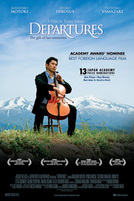
In Departures, Daigo Kobayashi is a young violinist who has finally become a member of a professional orchestra only to have the orchestra fold due to financial problems shortly after his success. Faced with no income, Daigo and his wife Mika Kobayashi move back to the small town where he grew up; they have a rent-free home there which was left to him by his mother when she died several years previously. In search of a source of income, Daigo answers an advertisement for a job working with “departures” thinking that the job is in travel. Much to his dismay, he discovers that the work is actually ritually preparing bodies for cremation or burial. As he is apprenticed to Ikuei Sasaki, Daigo enters the death sights of many people and performs this preparation ritual of washing and dressing the body while the family watches and prays.
To those of us in the West, this doesn't seem to be a big deal. It appears to be a different way of approaching death than our culture does: All burial preparation is done by funeral homes in our modern world. We have completely sterilized death and taken it out of the home as much as possible. However, in Japan, this ritual is still seen as an important part of preparing a body for the afterlife. It’s an act of love and devotion. Despite this importance, the men who act as the preparers are seen as unclean and having lowly careers. Daigo's wife actually leaves him because he refuses to give up his work in this new chosen field once he accepts that it is his vocation, his true calling in life.
I found Departures fascinating in how demonstrated a different modern culture’s approach to death, yet at the same time, it made me reexamine how our society handles (or more accurately, doesn't handle) death. While hospice care is making it far more common for members of our society to die at home when previous generations would only have died in hospitals (until history gets far enough back that dying was still at home), death is still a very taboo topic in American society. Morticians and funeral directors are still eyed with same skepticism at best. Often they are depicted as swindlers taking advantage of individuals in their hour of need. However, from my experience with my daughter’s death, I have to say that the funeral home director we worked with was one of the most honest and compassionate people we encountered during our trials. Thirty plus years after the death of his own infant daughter, he understood our pain in a way most people did not.
Most people don’t want to talk about death out of fear. It’s the great unknown for many. Our society acts as it often does when broached by something it fears: Ignoring anything that causes pain. Yet this approach is very unhealthy. We all will die. It’s one of those guarantees in life along with taxes. We will all know people whom we love who will die. Grief is an emotion we will have to face. And if we choose not to face these major emotions resulting from the deaths of those we love, we will create toxic wells of unvented emotion in our body, ones that can eventually cause physical suffering.
Overall, this is a movie about compassion as much as it is about death. Daigo must learn how to act from a different place than he ever has. Ikuei Sasaki’s tutelage helps him to come to terms with death and the rituals around it; this includes learning to forgive his own father who abandoned him many years ago when he was a child. Departures is a powerful movie, one of the best I've seen in many years. It’s one I’d like to watch again sometime because I feel I probably missed so much the first time around.
© 2015 Elizabeth Galen, Ph.D., Green Heart Guidance, LLC
 RSS Feed
RSS Feed